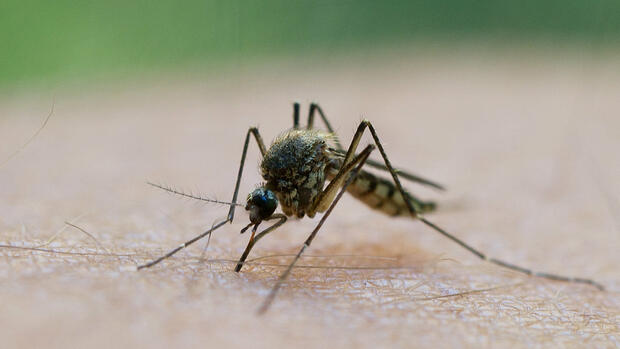Dusseldorf, Frankfurt It is a disease that, according to the World Health Organization (WHO), is one of the ten greatest threats to global health: dengue fever, which is accompanied by high fever, skin rashes and sometimes life-threatening bleeding. According to the WHO, up to 400 million people are diagnosed with it every year. The virus has now also arrived in Germany: there were 214 cases in this country between January and the end of May 2023 – more than three times as many as in the same period last year.
According to the Robert Koch Institute, there could be more and more infections with tropical viruses in the future. In addition to dengue, Zika and Chikungunya viruses are also likely to reach Europe. Climate change is to blame: Higher temperatures and heavy rainfall increase the risk of pathogens transmitted by mosquitoes or ticks.
Renke Lühken from the Bernhard Nocht Institute for Tropical Medicine considers this to be “worrying” because only a few of these pathogens have been approved for vaccines. Various pharmaceutical companies have long been researching to develop vaccines against such viruses. Some even want to produce them in Germany.
Bernhard Fleischer from the German Society for Tropical Medicine, Travel Medicine and Global Health (DTG) explains how infections can occur in Germany: “People travel to endemic areas, come back infected, have the virus in their blood for a few days. If mosquitoes are present and the temperatures are right, then an outbreak can occur,” he says.
>> Read here: Will 2023 be a strong year for pharma deals?
He does not believe that there will be tropical infectious diseases on a large scale in this country. “However, it is to be feared that we will see individual, smaller outbreaks in Europe,” said the expert.
The exotic pathogens are transmitted by the Asian tiger mosquito or the yellow fever mosquito. The Asian tiger mosquito first appeared in Germany in 2007 and has been spreading ever since.
Vaccines are only available against dengue fever
So far there are only vaccines against dengue fever. The Japanese pharmaceutical company Takeda received approval for its travel vaccine in Europe, Asia and Latin America at the end of last year. From now on, the vaccine is to be completely manufactured, filled, packaged and shipped all over the world in Singen on Lake Constance.
Takeda has invested over 300 million euros in its German site over the past few years. Most recently, 50 million euros flowed to be able to produce even more dengue vaccine and send it all over the world. The company inaugurated the new production halls this Tuesday.
The Japanese group is expanding its vaccine production in Germany.
(Photo: IMAGO/Belga)
In addition to Takeda’s dengue vaccine, there is also one from Sanofi that was approved in 2018. However, it is only recommended for people who have previously contracted the virus and not as a travel vaccine.
Most pharmaceutical companies researching vaccines against tropical viruses are located in countries where they are widespread. In addition, it is mainly small and medium-sized providers. Many projects are supported by global organizations such as the vaccine alliances Gavi or Cepi, in which public and private partners – including large pharmaceutical companies – are involved to finance life-saving vaccinations for people in low-income countries.
>> Read here: Merck boss considers decoupling from China “not feasible in the next two decades”
The US company Moderna, which developed the corona vaccine Spikevax, is also researching vaccines against tropical viruses. The furthest is a remedy for the Zika virus. Before a vaccine is approved, it goes through pre-clinical phases and then three clinical trial phases in which it is tested in humans. The Zika vaccine is currently in phase two.
Moderna currently has a vaccine against the Nipah virus in phase I clinical trials. This can trigger encephalitis, which is often fatal. So far there has only been one documented case in Europe in the UK. Other vaccines against tropical viruses, including dengue fever, are still in preclinical development at Moderna.
Expert: AIt definitely doesn’t make sense to get vaccinated in Germany against diseases that aren’t even there yet
“Our global public health strategy includes advancing our mRNA vaccines for the prevention of infectious diseases,” said Shannon Klinger, Moderna’s chief legal officer. That is why Moderna has selected 15 diseases that should be combated as a matter of priority – based on recommendations from the WHO and Cepi.
Vaccines against the chikungunya virus, which can cause fever and severe joint pain, should soon be available: both the US company Emergent Biosolutions and the Franco-Austrian Valneva have completed the third clinical phase. Valneva has already submitted an application for approval in the USA and Canada, and this is expected to happen in Europe in the second half of the year.
Tropical medicine specialist Bernhard Fleischer is in favor of developing and producing prophylactic vaccines that could be offered to people in the region in the event of local outbreaks, for example. However, he also points out that most of the tropical diseases that are spilling over into Germany and Europe are not as dangerous as one might think.
“Where the mosquitoes are already and it’s always warm, there are still no outbreaks,” says Fleischer. “It definitely doesn’t make sense to get vaccinated in Germany against diseases that aren’t even there yet.”
Incidentally, according to experts, it is very unlikely that malaria, probably the most well-known tropical disease, will come to Europe. This requires a particularly large number of infected people and mosquitoes as carriers.
More: Expensive energy threatens drug production in Europe
